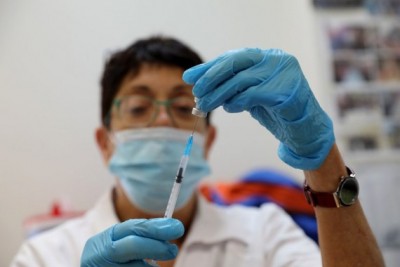
London, A 61-year-old Caucasian man in the UK experienced facial palsy after each dose of the Pfizer-BioNTech Covid vaccine, suggesting a strong link between the jab and Bell's palsy, according to the doctors at the National Health Service.
Bell's palsy -- a facial nerve palsy of unknown cause, where muscles on one side of the face become weak or paralysed.
In the journal BMJ Case Reports, the doctors describe the first such case to be reported in the medical literature of two separate unilateral facial nerve palsies, occurring shortly after each dose of a Covid-19 vaccine.
The man had no previous history of facial nerve palsy, but had a high Body Mass Index, high blood pressure, high cholesterol and Type-2 diabetes. Both doses of the vaccine were administered to the left arm, reported the doctors.
The first episode of facial nerve palsy developed five hours after administration of the first dose and the second two days after administration of the second dose administered six weeks later.
Investigations at initial presentation to the emergency department were unremarkable, and the patient was diagnosed with Bell's palsy on both occasions, the doctors said.
The patient attended the emergency department after the first episode, unable to close his left eye properly or move the left side of his forehead and was diagnosed with Bell's palsy. Routine bloods and a CT head scan showed nothing of concern and he was discharged with a course of steroids, and the facial nerve palsy completely resolved.
The second episode was a more severe left-sided facial nerve palsy. The symptoms included dribbling, difficulty swallowing and inability to fully close his left eye. He went to the emergency department, where he was again prescribed a course of steroids. He was also referred to the emergency ENT (Ear Nose and Throat) clinic, which continued the steroids and referred him to ophthalmology, the doctors reported.
"We describe the first case of Bell's palsy occurring after each dose of any UK-approved Covid-19 vaccine. Single episodes of unilateral facial nerve palsies have been reported in clinical trials and in subsequent case reports. There has been no evidence, however, of an episode after each dose," said Dr Abigail Burrows, ENT, Royal Surrey County Hospital NHS Foundation Trust, Guildford, UK.
"We also describe the earliest onset of symptoms from the timing of administration of the vaccine, further suggesting Bell's palsy was associated with the vaccine," she added. However the doctors noted that a causal relationship cannot be established.
The doctors report that his symptoms have greatly improved and the patient is almost back to normal.
Single episodes of unilateral facial nerve palsies were reported in the initial clinical trials of the three major Covid-19 vaccines approved for use in the UK -- Pfizer-BioNTech, Moderna and Oxford/AstraZeneca -- and there have been subsequent case reports.
In Phase-III trials, four cases of Bell's palsy were reported in volunteers who received the Pfizer vaccine compared with none in those who received the placebo vaccine, and three cases were reported in volunteers who received the Moderna vaccine compared with one in the placebo group.
Three cases of facial nerve palsy were also reported in volunteers who received the Oxford/AstraZeneca vaccine during clinical trials, and there were three cases in volunteers who received the placebo vaccine.


.jpeg)

